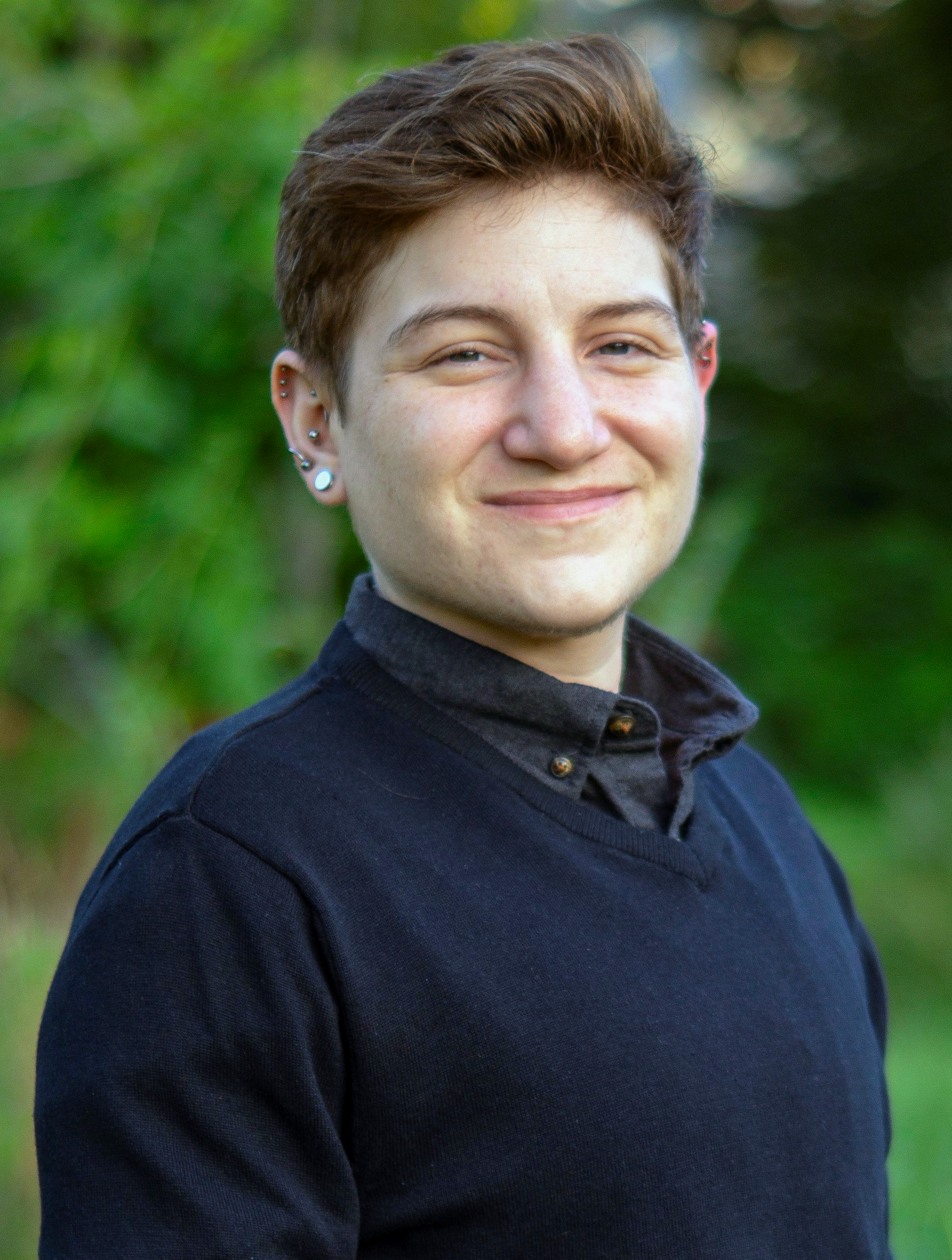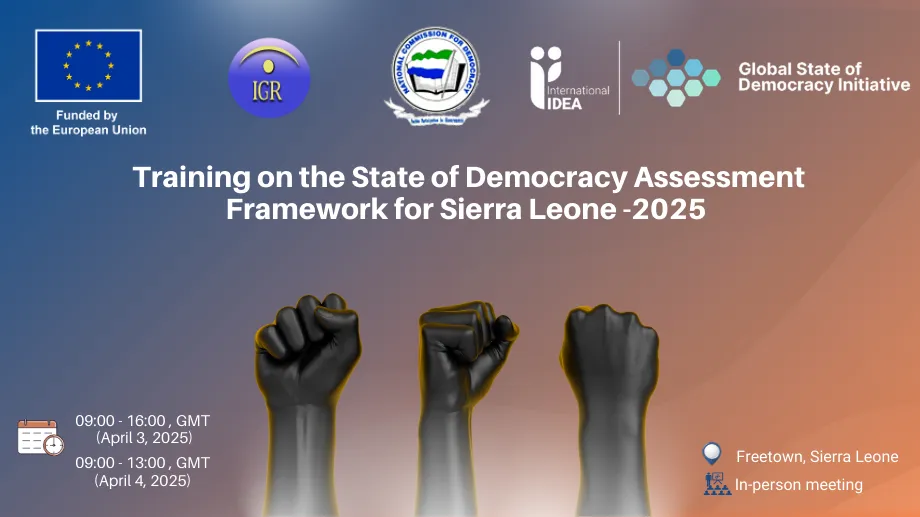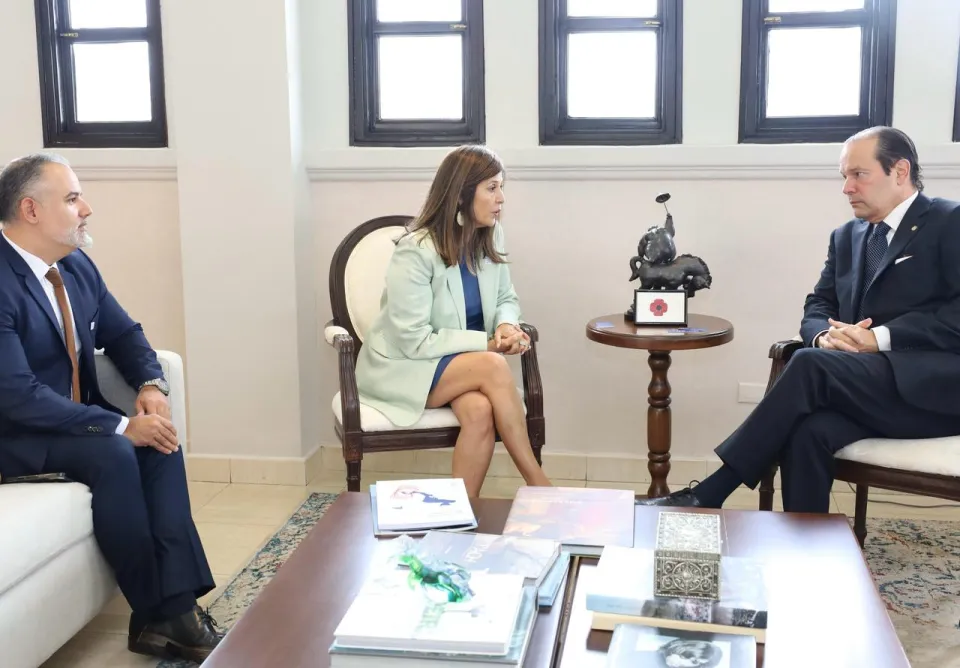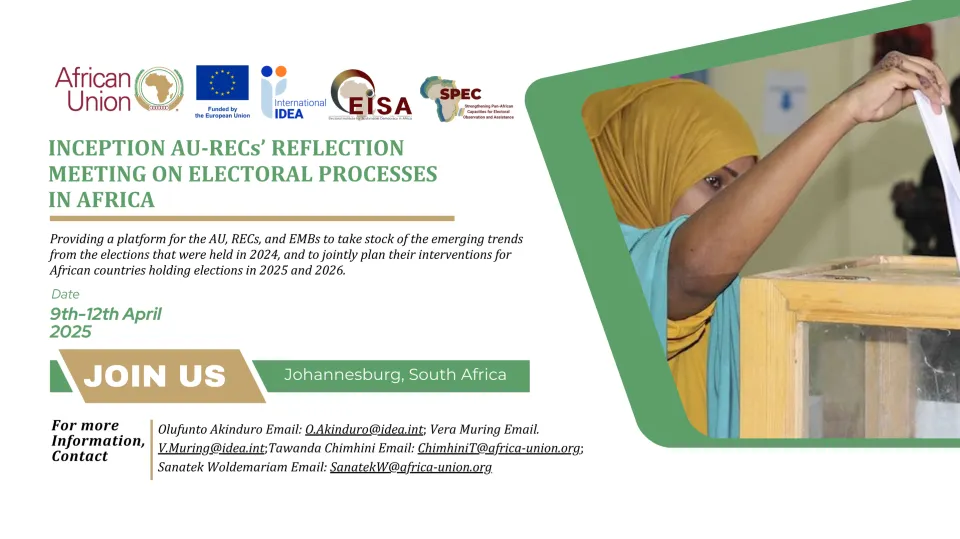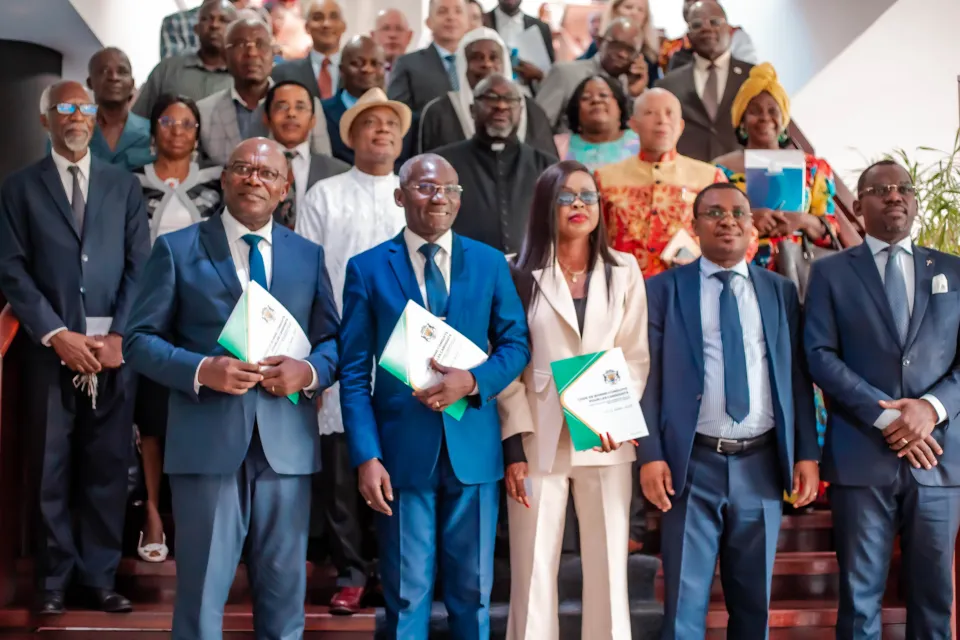International IDEA launches Impact Report on Second Summit for Democracy
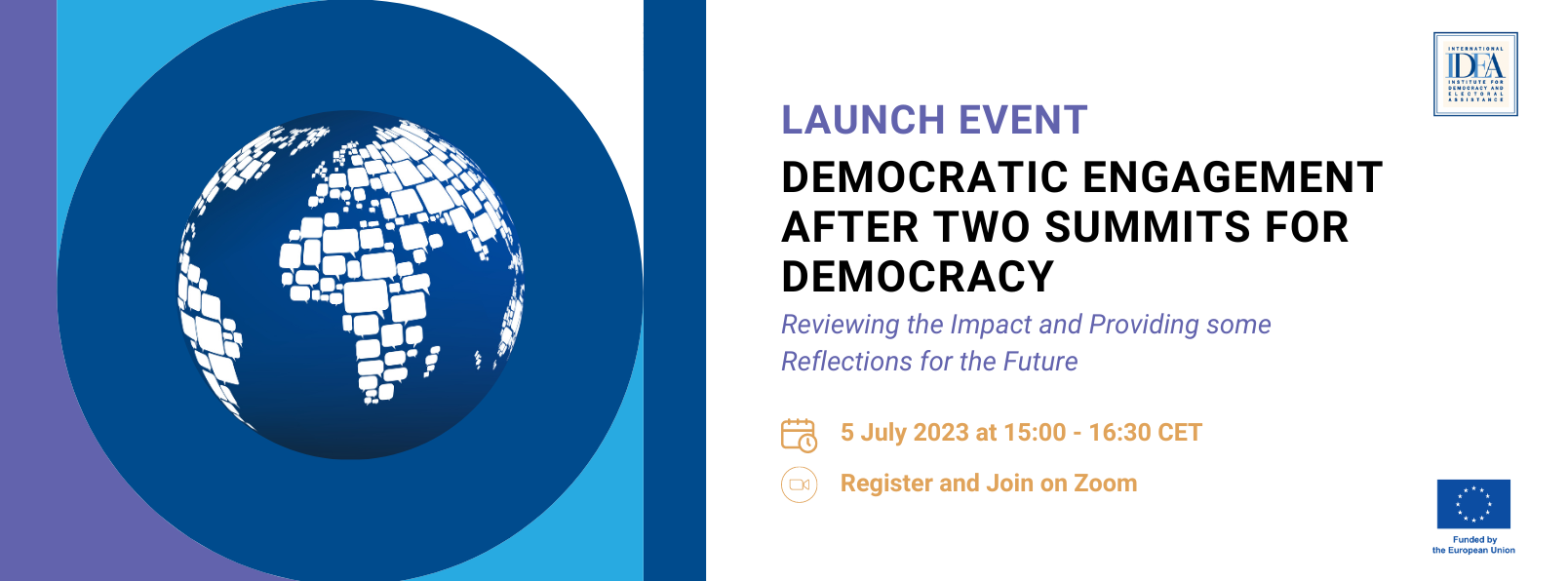
Following the Second Summit for Democracy on 29-30 March 2023, International IDEA produced the report: Democratic Engagement after Two Summits for Democracy: Reviewing the Impact and Providing some Reflections for the Future, which looked into the impact of the Year of Action and the Second Summit. The report reviewed the implementation of country commitments, the outcomes of the Democracy Cohorts and the role of civil society during the Year of Action and second Summit for Democracy. With the official announcement of the Third Summit for Democracy in South Korea in 2024, the report also set out to present a set of recommendations to shape an inclusive and effective Third Summit.
The Summit for Democracy is a Biden-led initiative where leaders from around the world were invited to discuss the challenges and opportunities facing democracies in the 21st century. In 2021, representatives of 98 participating governments announced around 750 commitments aimed at strengthening and safeguarding democracy at home and abroad. The Second Summit involved governments who were engaged in implementing commitments at the First Summit within the fields of building more resilient democracies, combating corruption and defending human rights, in addition to civil society, the private sector and others.
The report was officially launched on 5 July 2023 during an online event with about 140 participants representing governments and civil society organisations from across the globe, as well as members from various Democracy Cohorts. The event hosted representatives from the Government of Moldova, the Resisting Authoritarian Pressure Democracy Cohort, the Youth Café and Accountability Lab to discuss the report and to share their reflections and experiences with the Summit for Democracy.
Many of the speakers stressed the added value of the Summit for Democracy Process, whether it stimulated efforts for democratic reforms, bringing together and creating stronger collaboration between various actors, including governments and civil society, or strengthening various international bodies or initiatives working on democratic issues. At the same time, they also pointed out the need for improvements in a number of fields ahead of the Third Summit.
Moldova was one of the countries that made significant efforts in implementing their commitments, for instance through electoral reforms that strengthen political financing oversight and by various anti-corruption initiatives, including strengthening existing anti-corruption bodies and enforcement mechanisms, and introducing a new law on whistleblower protection. They also co-led the International Cooperation for Anti-Corruption Cohort that worked to improve international cooperation to combat high-level corruption. Valeriu Cupcea, from the National Anti-Corruption Centre in Moldova noted that the Summit process had played a significant role in encouraging progress and speeding up some of the reforms which otherwise may have taken longer to implement.
While the Summit process had the capacity to inspire action for reforms, it was also noted that a more structured process of accountability to commitments would be useful.
Blair Glencorse from Accountability Lab, as well as several participants in the discussion, stressed the need to better connect the Summit process to multilateral mechanisms such as the Open Government Partnership (OGP) implementation mechanism. The work of the Summit could also be driven through various initiatives that have organised around the Summit, for example the U.S Presidential Initiative to Renew Democracy, which is a set of policy and foreign assistance initiatives that build upon the U.S. Government’s work to bolster democracy and defend human rights globally. The Summit process was important in putting the limelight on democracy, while bringing together actors from different communities and with different priorities that normally would not talk to each other. Nonetheless, it was noted that summit participants should be conscious about what kind of narrative they want to build for the Summit to drive democracy forwards, as making democracy deliver could be conceived as a bit too simplistic
The Summit process had a positive effect on several existing initiatives and efforts. Katharina Madhuri Nielsen from the Alliance of Democracies (AoD) underlined that the Summit process was important in breathing new life into AoD ideas and initiatives through the Resisting Authoritarian Pressure cohort. In a similar way, and as was noted in International IDEA’s Summit for Democracy Cohort report, the Media Freedom Cohort was built on the work of the Media Freedom Coalition and helped revitalise the Coalition.
The Coalition will now continue the cohort’s work after the Second Summit. With greater attention to specific democracy-related topics, the Summit process and the Democracy Cohorts empowered various global initiatives.
As noted in the report, the Summit process has opened up opportunities for greater government – civil society collaboration, increased civil society inclusion and representation during the Year of Action, even if it is critical that more efforts be done in this regard, in particular through increasing the representation from civil society in the Global South and the private sector. Willice Onyango from the organisation Youth Café stressed that the Cohorts created a useful space for meaningful engagement for civil society as well as important networking opportunities, and gave civil society the opportunity to document and raise the ambition of commitments made by governments. Katharina Madhuri Nielsen noted that linking governments and civil society through the Cohorts created a safe space for democratic innovation and upkeep. For instance, in the Resisting Authoritarian Pressure cohort, the Lithuanian government used its partners to organise Cohort efforts and to increase visibility and the spread of its messaging and efforts. The Cohorts were seen as a useful mechanism for connecting the efforts of governments and civil society, but it was nonetheless pointed out that there is still work to be done to ensure more useful collaborations which again can generate more meaningful positive changes.
Madhuri Nielsen also stressed the need to maintain the momentum created during the Year of Action and ensure that Cohorts can help bring the Summit efforts forward. The lack of space for Cohorts during the Second Summit was a missed opportunity, and the organisers of the Third Summit need to focus on the work of the Cohorts during the next Year of Action and to secure a space for them at the next Summit.
Cohorts also need to find ways to work better together on deliverables and collaborate on how to optimise and coordinate efforts ahead of the next Summit.
Participants agreed that efforts were made to create a more inclusive Second Summit. For instance, the decision to hold regional Summits allowed for new entrants that otherwise would not have been able to participate. However, Willice Onyango stressed the need to make additional efforts to include more women and young people, especially those from civil society organisations in rural areas in the Global South that are harder to reach. In order to ensure a deeper and more meaningful inclusion, it is important to consider including countries and civil society groups that have not been part of the Summit process. A good effort during the Second Summit was the ‘Youth Activism in Civil Society’ event which was organised by the Global Democracy Coalition as part of the Costa Rica Summit, where civil society groups from Venezuela and Honduras participated. None of the countries were part of the Summit process.
The main takeaways from the event were the following:
- The Summit process represents an important lift in putting the limelight on democracy, while bringing together actors from different communities and with different priorities that normally would not talk to each other. However, the Summit process also had a knock-on effect beyond participating countries through the work of governments, civil society organisations, cohorts and others engaged in the process. The process has moreover generated discussions on democracy among civil society in countries that were not invited to participate. For instance, the ‘Youth Activism in Civil Society’ event which was organised by at Costa Rica Summit hosted civil society participants from non-Summit countries.
- However, the Summit did not always hit the right balance, for instance between the control of the U.S in shaping the process and other countries and civil society organisations and more needs to be done to find the right balance. For example, there is an urgent need for the next Summit organisers to work out clear outcomes for the next Summit and identify necessary steps to achieve these.
- Besides a more structured process to increase accountability around commitments and to better connect the Summit process to multilateral mechanisms such as the OGP, there is a need to create more bridges between the participation of governments and civil society.
- More efforts should be made to bring together other key actors, especially from the private sector, including in the work of the Cohorts.
- Finally, there is a need for Summit participants to think about what kind of narrative they want to build to drive democracy forwards—making democracy deliver is a bit too simplistic. Their work needs to better demonstrate the value of democracy, building a narrative through meaningful engagement.
To view the event, please visit: https://www.youtube.com/watch?v=XoUyg2EqHiM&feature=youtu.be

